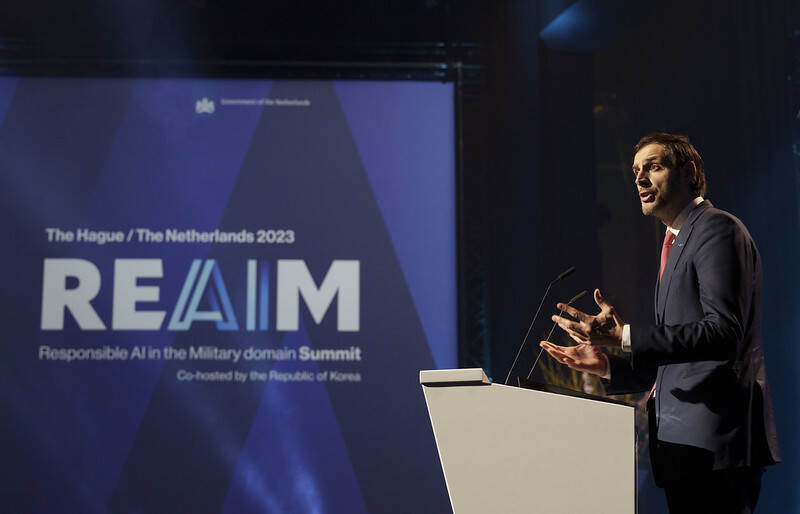Speech Minister Hoekstra at the opening of the REAIM Summit
Speech Minister Wopke Hoekstra at the opening of the REAIM Summit in the World Forum, The Hague on Wednesday 15 February 2023.
Ladies and gentlemen, dear friends,
AI has the potential to revolutionise the way wars are fought and won, but it also poses significant risks and challenges.
To prevent abuses, we need to establish international guidelines.
It’s crucial that we take action now.
Ladies and gentlemen, it wasn’t me who wrote these words, nor was it my speechwriter. It was ChatGPT. It generated these three sentences literally in a split second. Faster than you and I can write, speak or think.
This shows me the potential of AI, but also the potential of our combined wisdom. Because that’s what ChatGPT delivered: a combination of the thoughts, knowledge and expertise it was fed. And this gives me hope. That we can take action. Today and tomorrow. With the wisdom that is right in front of me in this room. Of military experts, academia, civil society and government officials. Your expertise is very much needed! Because AI might soon exceed our combined knowledge.
AI is everywhere. It’s on our children’s phones, where ChatGPT is their new best friend where homework is concerned. It’s changing the way we live. It’s changing the way we work. And it’s clearly changing the military. It’s been estimated that AI is as groundbreaking as nuclear technology. And that it has huge, huge potential.
Just imagine a missile hitting an apartment building… In a split second, AI can detect its impact and indicate where survivors might be located. Even more impressively, AI could have intercepted the missile in the first place. Yet AI also has the potential to destroy within seconds. And that’s worrying: considering that over the past decades, only prudence has prevented nuclear escalation. How will this develop with technology that can make decisions faster than any of us can think?
As Henry Kissinger and Eric Schmidt observed in their book The Age of AI: ‘unless care is taken to develop a common concept of limits, the compulsion to act first may overwhelm the need to act wisely’. This is just one of the complexities we must take into account in the coming days, when we discuss the technology’s full scope, from drone swarms to intel and surveillance.
Together, we must seek common ground on the definitions of these technologies, starting with two actually quite basic questions: What is AI? And who is responsible for its actions? We need to answer these questions before we can set common standards. And before we can allocate responsibilities and agree on tools that mitigate risks.
Unlike nuclear weapons, AI has not been unleashed on the battlefield. You could say this gives us time. Just look at the past: At the ban on expanding dum-dum bullets that left victims with horrific wounds… The prohibition of biological and chemical weapons… And the treaty to prevent the spread of nuclear weapons.
These are clearly agreements that shaped our future, but unfortunately were a necessary response to events that could not be undone. They followed the development of new weapons… The chemical and nuclear arms race… Countless victims and inexplicable cruelty.
Today, we have the opportunity to pre-empt a similar future. But we must act fast. In Ukraine we are unfortunately already witnessing the influence of new technology, including drones and cyberattacks. We are also witnessing how Russia is violating international humanitarian law in the most gruesome way.
Today, we have the opportunity to expand and fortify the international legal order, and prevent it breaking down. I am convinced that we can truly make a difference here in The Hague. Just like our predecessors did in 1899 and 1907, when they laid the groundwork for a new international system based on law.
Today, we can build on that effort, and make it fit for the twenty-first century. By ensuring the responsible development, deployment and use of AI in the military domain, within the parameters of international law. I very much look forward to your contributions in the coming days and I wish you a great conference.
Thank you.
